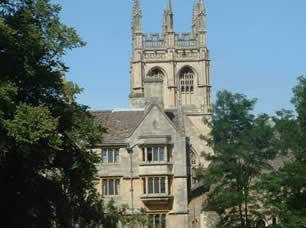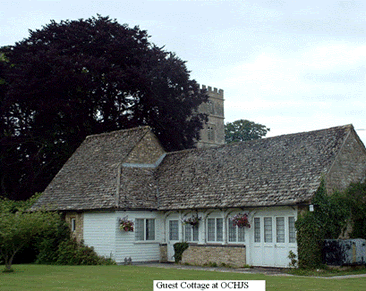Letter from the Directors

Oxford—“The City of Dreaming Spires”. For almost 800 years, scholars have gathered in its colleges and halls, creating a lively intellectual community. Join with them during summer 2008 as a participant in Holy Land and Holy City in Classical Judaism, Christianity, and Islam. This NEH summer institute for college and university faculty will meet for five weeks (9 July-12 August 2008) to explore the significance of the Holy Land (and the holiest of its cities, Jerusalem) in Judaism, Christianity, and Islam in late antiquity and the Middle Ages. Successful applicants will receive a stipend of $3600. (Nonetheless, given the expense of travel abroad, we encourage all participants to seek supplemental research or travel funds from their own institutions.)
Few places on the face of the earth have evoked as much interest, passion, and resolve as the geographical area between the Mediterranean Sea and the Jordan River—whether one calls it Canaan, Judea, Israel, Palestine, Zion, or the Holy Land—which assumed a central importance in each of the three monotheistic religions born in the Middle East. Our institute will investigate the encounter between land and civilization, between physical space and the distinctly human quest for spiritual fulfillment in this world (and perhaps the next). How—and to what effect—have people acted upon their appreciation of the land and its sanctity? How do the processes whereby classical Judaism, Christianity, and Islam endowed the Holy Land with its singular character find expression in the academic study of history and culture? Four overlapping scholarly questions will figure prominently in our discussions:
- How is space sanctified?
- What role do sanctified places play in pilgrimage, ritual, and liturgy?
- Can the experience offered by particular sanctified places be recreated elsewhere?
- How did competing claims to sanctified spaces contribute to religious polemic and mutual hostilities, e.g. in the harsh realities of holy war and the Crusades?
Institute faculty:
Jeremy Cohen, institute co-director, is the Spiegel Family Foundation Professor of Jewish History at Tel Aviv University. Three-time winner of the National Jewish Book Award (U.S.A.) and now editor of the Israel Historical Society’s leading journal of Jewish history, Zion, Cohen has studied aspects of the encounter between late ancient and medieval Judaism and Christianity—ideas of alterity, interreligious polemic, comparative biblical exegesis, and eschatology. His latest books include Sanctifying the Name of God (2004), which analyzes narratives of martyrdom from the First Crusade.
Irven M. Resnick, institute co-director, is Professor of Philosophy and Religion and holds the Chair of Excellence in Judaic Studies at the University of Tennessee at Chattanooga. He has worked in medieval philosophy, theology, and intellectual history for many years, with particular attention given to the twelfth-century renaissance and Jewish-Christian encounters during this period. He has been a Senior Associate at the Oxford Centre for Hebrew and Jewish Studies (OCHJS) since 2003 and a faculty associate at Oxford University’s Oriental Institute since 2006. Most recently, he published Petrus Alfonsi’s Dialogue Against the Jews (2006).
Thomas Asbridge (Queen Mary, University of London), Senior Lecturer in Medieval History at the University of London. Dr. Asbridge has quickly established himself as a leading expert on the Crusades. His most recent book, The Roots of Conflict between Christendom and Islam (issued in the U.S. as The First Crusade: A New History) has been reissued in Dutch and Polish translations.
Martin Goodman (Wolfson College, Oxford University) F.B.A., an expert on Jews, Judaism, and Jewish-Gentile relations in the Greco-Roman world, is Professor of Jewish Studies, Fellow of Wolfson College, and Chair of the Faculty Board of Oriental Studies at the University of Oxford. His books include The Ruling Class of Judea (1987, and since translated into Portuguese, Italian, and Hebrew), and Rome and Jerusalem: The Clash of Ancient Civilizations (2007); he is editor of theOxford Handbook of Jewish Studies.
Georgia Frank (Colgate University), a specialist on ancient Christianity with a special interest in pilgrimage, is Associate Professor of Religion at Colgate University. She is the author of The Memory of the Eyes: Pilgrims to Living Saints in Christian Late Antiquity (2000) as well as numerous articles treating pilgrimage, Christian spirituality, and monasticism.
Carole Hillenbrand (University of Edinburgh), Professor of Islamic History and Head of the Department of Islamic and Middle Eastern Studies at the University of Edinburgh, received the King Faisal International Prize in Islamic Studies in 2005. Well-known as a lecturer (in English, French, German, and Arabic) throughout Europe, North America, and the Arab world, she is one of the world’s most respected scholars on the perception and impact of the Crusades in Muslim civilization. Her The Crusades: Islamic Perspectives is now being translated into Arabic, Russian, and Malay.
Ora Limor (The Open University of Israel) is Professor of History and Vice-President for Academic Affairs at the Open University of Israel. A student of Joshua Prawer, Amnon Linder, B.Z. Kedar, and other distinguished scholars, her books and articles justify her standing as an authority on religious polemics in the Middle Ages, Christian sacred traditions in the Holy Land, and religious pilgrimage in Christian, Jewish, and Muslim culture. Her Holy Land Travels (2000) won the Ben Zvi Prize for research on the Land of Israel.
Suleiman Mourad (Smith College) trained at the American University in Beirut and at Yale. He has taught Middle Eastern history and Islamic Studies at the American University in Beirut, Middlebury College, and Smith College, where he is now Assistant Professor of Religion. In two books and over a dozen scholarly articles, Mourad has focused above all on the interaction of Judaism, Christianity, and Islam during the classical Muslim period. His Jerusalem: Idea and Reality, edited with Tamar Mayer, is now in press.
Yoram Tsafrir (Hebrew University) is Professor of Archeology and former director of the Institute of Archeology at the Hebrew University of Jerusalem, where he also served as director of its Jewish National and University Library. A fellow of the Harvard University-Dumbarton Oaks Center for Byzantine Studies, Tsafrir has authored or edited well over 150 scholarly publications, including Sefer Yerushalaim [The History of Jerusalem]—The Roman and Byzantine Periods (70-638 CE) [1999]; Iudaea Palaestina: Eretz Israel in the Hellenistic, Roman and Byzantine Periods (co-authored with Leah Di Segni and Judith Green; 1998); and, Ancient Churches Revealed (1993). He brings an unrivalled versatility to his archeological research, which he enriches with sensitivity to issues of historical geography, anthropology, and cultural history.
Our study is an exciting one. We will provide all readings in English and do not require facility in Greek, Latin, Hebrew, Arabic, or medieval vernaculars. The five-week program will meet for lectures, discussions, and seminars on Mondays, Tuesdays, Thursdays, and Fridays. Reading assignments should not exceed 100 pages per day. Wednesdays are reserved for optional trips, individual discussion with core faculty, or private research and reading. On Mondays we will meet from 1:00 PM until 3:30 PM (with a coffee break at the mid-point), while on Fridays meetings will be scheduled from 9:30-10:15, followed by a short break, with discussion continuing from 10:30 to noon. Tuesday and Thursday meetings will be held from 9:30 to 11:30 and 1:00 to 3:00. At the program's conclusion, the institute's twenty-five participants will be asked to prepare model syllabi incorporating the materials from our investigation into undergraduate courses. These may be distributed subsequently to all participants.
The program will be conducted in England at the Oxford Centre for Hebrew and Jewish Studies (OCHJS). Located on its own campus in Yarnton, four miles from the center of Oxford, OCHJS is a recognized independent post-graduate center of the University of Oxford. In addition to access to the OCHJS library, institute participants, who will have the status of visiting faculty members, will enjoy privileges at Oxford's Bodleian library and related university libraries. For library hours, see http://www.utc.edu/Outreach/NEHHolyLand/venue.php, scroll down to "Libraries".

Public transportation to Oxford and nearby towns (e.g. Woodstock) is readily available, but participants should be prepared to walk 4-5 blocks to the bus stop. Since the academic year at OCHJS will have ended, all of Ricardo House, the graduate student residence at OCHJS, has been reserved for participants. It contains sixteen large private rooms arranged in four suites. Each suite consists of four comfortable private bedrooms around a shared fully equipped kitchen and a bath. No meals are included nor is there food service at OCHJS, but coffee and tea will be provided daily in the senior common room of the manor house. Moreover, groceries and necessities can be obtained a few blocks away, and there are two pubs with excellent menus within a short walk. In addition to Ricardo House facilities, other single rooms will be available at OCHJS to accommodate all 25 participants. We may also have a few one or two bedroom flats available for participants accompanied by a spouse, partner or family member. We strongly encourage all participants to reside at OCHJS in order to create an intellectual community. Seminar rooms and library facilities at OCHJS—not to mention facilities in Oxford—are not handicap-accessible (please contact Irven Resnick directly with inquiries concerning special needs). Although there are no athletic facilities at OCHJS, there are walking paths and bicycle paths. Bicycles can be rented from a number of area vendors. Laundry facilities are available on site. For participants with families that can not be accommodated on the OCHJS campus, we will compile a list of furnished flats or houses available to rent in Yarnton, Oxford, or other nearby communities.
The price for OCHJS accommodations has yet to be set, but single rooms will likely cost about £1100 for five weeks, which will include a bus pass for transportation to Oxford (equivalent to £50) and the cost of a reader’s card (£12.50) at the Bodleian library. At current exchange rates, £1100=$2250. Understand that housing in Oxford is very expensive,and we therefore encourage all participants to seek supplemental research or travel funds from their own institutions. Rentals in town will be much higher. The price for flats will be supplied on request.
We encourage institute participants to bring laptop computers. OCHJS has a wireless network providing access to the internet and web-based e-mail from anywhere on campus. Those who do not bring a laptop will have weekday access to PCs in the OCHJS library, which have internet connections and a printer. Finally, we expect to make one or two computers available for general use in a seminar room on the campus. These will have internet connections and be linked to at least one printer. Nonetheless, participants may not have the ready access to computers and the internet to which they are accustomed at home institutions.
Applications consist of an application cover sheet, brief curriculum vitae, essay, and two letters of recommendation (to be sent separately). Perhaps the most important part of the application is the essay. This should include relevant personal and academic information; reasons for applying; a discussion of your qualifications and interest in the topic; and, a discussion of what you hope to gain by participation, in relation both to your research and teaching. The cover sheet will be completed on-line at http://www.neh.gov/online/education/participants. Other materials should be submitted as e-mail attachments to Irven Resnick. For additional information, seehttp://www.utc.edu/Outreach/NEHHolyLand/applications.php. All materials must be submitted by 3 March 2008. Applicants will be notified of the outcome by April 1, 2008, and successful applicants will have until April 15 to accept or decline the offer.
Please send completed applications by e-mail to:
Professor Irven M. Resnick ([email protected])
or mail to: Professor Irven M. Resnick, Department of Philosophy and Religion (Dept. 2753)
University of Tennessee at Chattanooga
615 McCallie Ave.
Chattanooga, TN 37403-2598